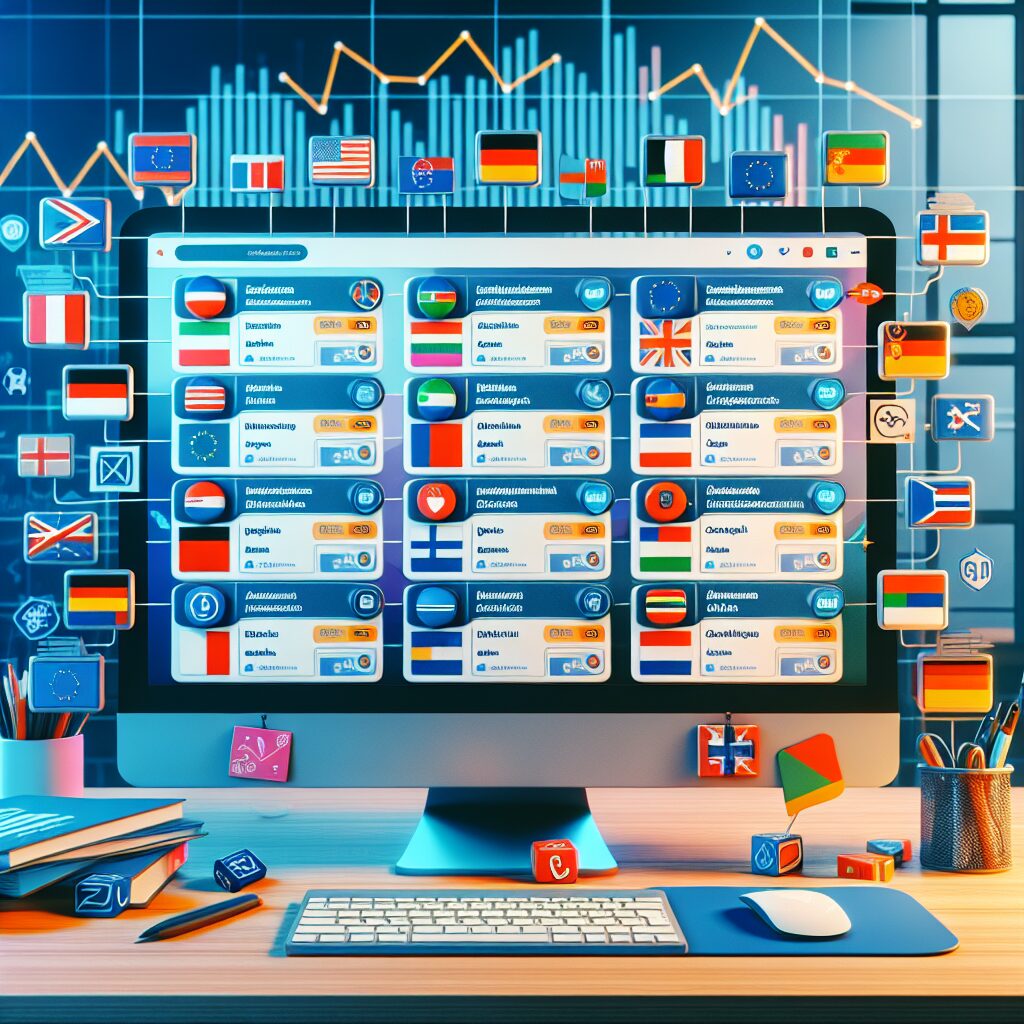About eldris
At Eldris, we automate SEO, multilingual site expansion, and EU compliance for brands scaling across Europe. Our AI-powered platform handles everything from content publishing to regulatory docs—so you don’t have to.
In This Article
- Ecommerce seo automation saves significant time and enhances scalability.
- AI transforms product page SEO via real-time semantic insights.
- Top tools include SurferSEO, BrightEdge, and INK Editor.
- Avoid duplicate content, over-automation, and under-analysed workflows.
- Use hybrid models combining automation with manual oversight.
- Track KPIs like conversion uplift and SEO-driven ROI.
- Always integrate automated tactics with broader growth strategies.
- The future lies in hyper-personalised, context-aware SEO automation.
In 2025, ecommerce brands are pushing for unprecedented scalability, and ecommerce seo automation is the tool empowering this evolution. This article explores how automation transforms keyword optimisation, product visibility, and traffic generation at scale. By leveraging AI-powered workflows and smart data processing, ecommerce sites can outperform competitors while drastically reducing manual effort. Learn actionable methodologies, the best automation tools, strategic integrations, and common pitfalls to avoid.
Why Ecommerce SEO Automation Matters in 2025
Understanding the Shift from Manual to AI-Powered SEO
Traditionally, ecommerce SEO was a laborious, time-intensive process involving keyword research, metadata updates, content writing, and trend monitoring — all manually executed. However, with the exponential growth of ecommerce platforms and product catalogues, manual SEO has become unsustainable. Enter ecommerce seo automation — a gamechanger in 2025 that utilises AI-driven tools to handle repetitive SEO tasks with unmatched precision and speed.
This shift is not just a trend but a necessity. Ecommerce businesses must optimise thousands of product pages, ensure real-time ranking updates, and adapt quickly to Google algorithm changes. Automation significantly reduces manual hours while ensuring consistency across on-page SEO elements, structured data, backlinks, and performance reports. Platforms that integrate AI now dominate rankings due to their unmatched responsiveness and strategic agility.

Key Benefits of Automating SEO for Online Stores
Time Savings, Consistency, and Scalability
Ecommerce seo automation delivers measurable advantages that make it indispensable to modern digital marketers. Firstly, time savings are profound. Automating tasks like title tag generation, meta descriptions, and image alt-text creation can free up hundreds of hours per month, allowing marketers to focus on strategic activities rather than tactical execution.
Consistency is another critical benefit. With automation tools, every product page follows standard SEO frameworks, ensuring proper use of schema markup, optimal heading structures, and uniform internal linking practices. Without automation, such uniformity is nearly impossible at scale.
Furthermore, scalability sets businesses apart in competitive markets. Growing from 1,000 product listings to 50,000 becomes feasible when automation handles SEO updates dynamically, across languages, categories, and devices. Together, these benefits make the business case for automation ironclad.
“SEO automation is no longer optional — it’s the foundational pillar of scalable ecommerce growth.”
How AI is Revolutionising Product Page SEO
Artificial intelligence isn’t merely assisting SEO; it’s redefining it. AI-driven solutions are able to extract and analyse intent from search behaviour, allowing ecommerce platforms to automatically match product attributes to trending keywords in real time. These insights power everything from smarter content automation to predictive ranking models.
AI tools can generate dynamic product descriptions tailored to current search trends, automatically rewrite meta tags to improve CTR, and even recommend product bundles based on demand patterns. Additionally, tools powered by NLP (natural language processing) ensure that all content aligns semantically with user search phrases—enhancing both relevance and ranking.
Semantic SEO, a concept that focuses on topic clusters rather than keyword stuffing, finds perfect alignment with AI models like BERT and GPT. By applying these models, ecommerce businesses can establish topical authority in key categories effortlessly.
The Best Tools for Ecommerce SEO Automation
To start with ecommerce seo automation, using industry-grade tools is vital. A few standout platforms include:
- SurferSEO: Automates content optimisation and suggests NLP-focused structures for maximum topical alignment.
- BrightEdge: Offers AI-powered recommendations and automation for metadata, reporting, and competitive analysis.
- Screaming Frog: Recently enhanced with machine learning add-ons for automated diagnostics of SEO issues.
- INK Editor: AI-enhanced writing tool that ensures semantic alignment, readability, and keyword saturation.
- Ahrefs and SEMrush: These stalwarts now offer workflow automation features, real-time tracking, and bulk SEO schedules.
Choosing the right toolset is dependent on your tech stack and team capabilities. Teams equipped with developers can create custom scripts using APIs, while creative teams may prefer drag-and-drop automation solutions.
Common Pitfalls and Mistakes to Avoid
Mistakes in Ecommerce SEO Automation Implementation
Despite the immense benefits, improper use of ecommerce seo automation can lead to setbacks. One common error is over-reliance on automation without manual validation. AI tools are powerful, but they can misinterpret context — particularly with brand names, user-generated content, or niche product features.
Another major pitfall is duplicate content generation. If content templates are poorly designed, automation can output content that is too similar across multiple pages — triggering penalties. It’s crucial to inject variability using dynamic fields and contextual AI inputs.
Businesses also make the mistake of neglecting backlink activity. While on-page SEO automation is well-covered, link building often remains manual. However, platforms now exist that analyse backlink gaps and auto-generate outreach templates — making it possible to automate portions of off-page SEO too.
Integrating Automated SEO with Your Growth Strategy
SEO should not function in isolation. To maximise the impact, ecommerce seo automation must integrate with your broader marketing and growth strategy. For instance, syncing automated product page SEO with your content marketing calendar ensures thematic consistency. When your blog posts are optimised around the same semantic cores as your product listings, search engines view your site as authoritative in your niche.
Furthermore, integration with analytics platforms such as Google Data Studio enables real-time tracking of automation-driven improvements. Insights into which categories are performing post-automation can guide campaign strategies and budget allocation. Ideally, automation workflows should also connect to email marketing, allowing for better customer segmentation based on SEO entry points. Learn more about Ecommerce Site Optimisation & Automation
When to Use Manual Oversight in Your SEO Workflow
While ecommerce seo automation handles scale, manual oversight remains essential in specific contexts. For example, flagship product pages — especially those with high traffic or revenue impact — should undergo human review to ensure copy precision, tone alignment, and branding consistency.
Manual input is also valuable when deploying experimental content formats, like interactive pages, quiz-based product selectors, or influencer collaborations. These unstructured elements often fall outside the scope of AI and can benefit from editorial input. A hybrid model — automation at scale and manual review for high-impact assets — yields the strongest SEO outcomes. Read a related article
Measuring Impact: KPIs and ROI Post-Automation
Understanding whether your SEO automation investment is yielding returns requires robust performance tracking. Key performance indicators should include:
- Organic traffic growth: Changes in traffic sources by category and landing page post-automation.
- Indexation rate: Whether more pages are now being indexed thanks to automated optimisations.
- Conversion rates: Has automation improved buyer journeys and product discoverability?
- Bounce rate and time-on-site: These indicators reflect the quality of AI-generated content.
- Time/resources saved: Measure internal operation hours reallocated from manual SEO tasks.
Use comparisons over a 3-month base period to determine statistical significance. ROI should be measured not just by cost savings, but by long-term revenue uplift driven by improved discovery and engagement.
Case Study: A Scalable SEO Framework in Action
Consider the example of a European fashion ecommerce outlet that scaled from 8,000 to 75,000 product SKUs within a year. Initially dependent on a small SEO team, they faced indexing delays, declining product visibility, and fragmented metadata. After adopting ecommerce seo automation via BrightEdge and a bespoke NLP content pipeline, the company witnessed the following:
- 37% increase in organic traffic within six months
- 200% growth in mobile search conversions
- Massive reduction in orphan pages through dynamic internal linking
- Time spent on SEO decreased by 60%
Most notably, their average ranking position improved by two slots across all products, simply by making schema and metadata consistent. This showcases the transformative effect of structured automation, particularly when paired with market-specific contextual intelligence. Best practices for optimising ecommerce sites
The Future of Ecommerce SEO Automation
The horizon for ecommerce seo automation points towards hyper-personalisation. With the evolution of AI tools, SEO will not just respond to keyword trends but adapt in real-time to individual shopper identities, behaviours, and contexts. Expect systems to generate dynamic page content tailored to searcher profiles using first-party data and cookieless tracking solutions.
Additionally, voice and image search will shape future automation. AI tools will scrape product visuals, apply image SEO best practices, and dynamically rescale content for different formats, including AR and VR. Tomorrow’s SEO is not just responsive; it is predictive and personalised.
Conclusion and Recommended Tools to Get Started
Ecommerce seo automation is redefining the competitive landscape for online retailers. By leveraging AI tools, integrating workflows into the broader marketing strategy, and maintaining oversight where needed, ecommerce businesses can achieve growth at scale without compromising quality or brand voice. From automated metadata to real-time keyword adaption, automation eliminates bottlenecks and paves the way for data-driven dominance in search rankings.
To commence your automation journey, begin with tools like SurferSEO, BrightEdge, or even build custom workflows using GPT models. Remember to measure everything, avoid over-automation, and always keep user experience at the core of your automated strategies.
Great guide on automate-seo-for-ecommerce-sites-tactics-for-rapid-growth – Community Feedback
Can SEO be fully automated for ecommerce sites?
Many SEO tasks for ecommerce can be automated—like meta tag creation, content generation, and technical audits—using AI and the right tools, but human oversight is still required for best results.
Which SEO tasks should you automate first?
Automate repetitive tasks such as product page optimisation, internal linking, image ALT tags, and multi-language publishing first to save time and achieve consistency across your ecommerce site.
What’s the benefit of SEO automation for online shops?
SEO automation accelerates site growth, maintains optimisation across thousands of pages, and reduces manual workload, enabling ecommerce brands to scale faster and stay competitive globally.








